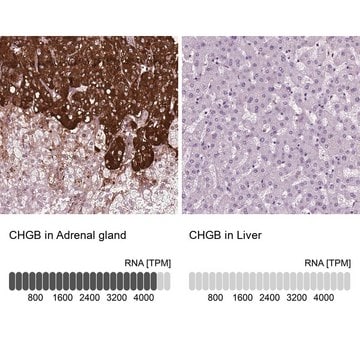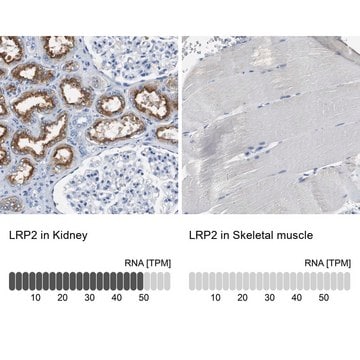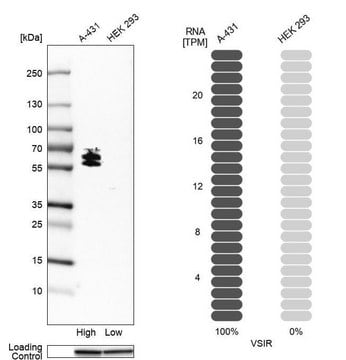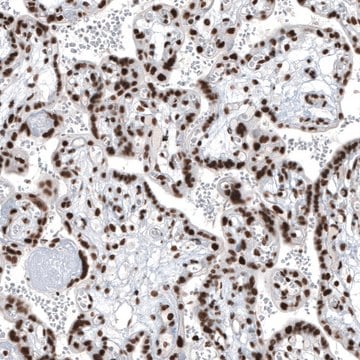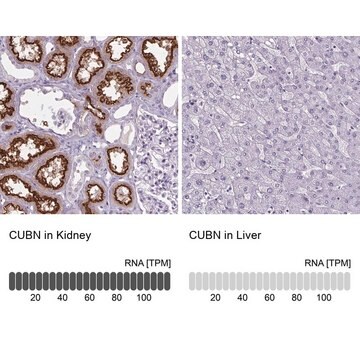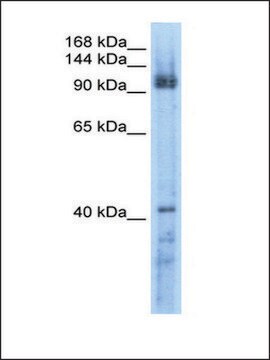추천 제품
생물학적 소스
rabbit
결합
unconjugated
항체 형태
affinity isolated antibody
항체 생산 유형
primary antibodies
클론
polyclonal
제품 라인
Prestige Antibodies® Powered by Atlas Antibodies
형태
buffered aqueous glycerol solution
종 반응성
human
향상된 검증
independent
orthogonal RNAseq
Learn more about Antibody Enhanced Validation
기술
immunoblotting: 0.04-0.4 μg/mL
immunofluorescence: 0.25-2 μg/mL
immunohistochemistry: 1:500-1:1000
UniProt 수납 번호
배송 상태
wet ice
저장 온도
−20°C
타겟 번역 후 변형
unmodified
유전자 정보
human ... CHGB(1114)
면역원
Secretogranin-1 precursor recombinant protein epitope signature tag (PrEST)
Sequence
KQYSSHHTAEKRKRLGELFNPYYDPLQWKSSHFERRDNMNDNFLEGEEENELTLNEKNFFPEYNYDWWEKKPFSEDVNWGYEKRNLARVPKLDLKRQYDRVAQLDQLLHYRKKSAEFPDFYDS
Sequence
KQYSSHHTAEKRKRLGELFNPYYDPLQWKSSHFERRDNMNDNFLEGEEENELTLNEKNFFPEYNYDWWEKKPFSEDVNWGYEKRNLARVPKLDLKRQYDRVAQLDQLLHYRKKSAEFPDFYDS
애플리케이션
All Prestige Antibodies Powered by Atlas Antibodies are developed and validated by the Human Protein Atlas (HPA) project and as a result, are supported by the most extensive characterization in the industry.
The Human Protein Atlas project can be subdivided into three efforts: Human Tissue Atlas, Cancer Atlas, and Human Cell Atlas. The antibodies that have been generated in support of the Tissue and Cancer Atlas projects have been tested by immunohistochemistry against hundreds of normal and disease tissues and through the recent efforts of the Human Cell Atlas project, many have been characterized by immunofluorescence to map the human proteome not only at the tissue level but now at the subcellular level. These images and the collection of this vast data set can be viewed on the Human Protein Atlas (HPA) site by clicking on the Image Gallery link. We also provide Prestige Antibodies® protocols and other useful information.
The Human Protein Atlas project can be subdivided into three efforts: Human Tissue Atlas, Cancer Atlas, and Human Cell Atlas. The antibodies that have been generated in support of the Tissue and Cancer Atlas projects have been tested by immunohistochemistry against hundreds of normal and disease tissues and through the recent efforts of the Human Cell Atlas project, many have been characterized by immunofluorescence to map the human proteome not only at the tissue level but now at the subcellular level. These images and the collection of this vast data set can be viewed on the Human Protein Atlas (HPA) site by clicking on the Image Gallery link. We also provide Prestige Antibodies® protocols and other useful information.
생화학적/생리학적 작용
CHGB (chromogranin B) plays an essential role in the synthesis of secretory vesicles. In neuroendocrine system, it has both intracellular and extracellular roles. It plays an essential role in neuroendocrine/sympathoadrenal stress response to systemic infection, where it cleaves chromaffin granule proteins at dibasic sites to produce smaller peptides. It is also responsible for the sorting and transport of peptide hormones and neuropeptide precursors to secretory granules. This, is turn, might be responsible for initiating the synthesis of secretory granules. Variants of this gene are linked with isoprostane formation, which is linked with oxidative stress. Polymorphisms in this gene are also associated with increased susceptibility and onset of amyotrophic lateral sclerosis (ALS), where abnormalities in secretory pathway might lead to elevated vulnerability of motor neurons.
특징 및 장점
Prestige Antibodies® are highly characterized and extensively validated antibodies with the added benefit of all available characterization data for each target being accessible via the Human Protein Atlas portal linked just below the product name at the top of this page. The uniqueness and low cross-reactivity of the Prestige Antibodies® to other proteins are due to a thorough selection of antigen regions, affinity purification, and stringent selection. Prestige antigen controls are available for every corresponding Prestige Antibody and can be found in the linkage section.
Every Prestige Antibody is tested in the following ways:
Every Prestige Antibody is tested in the following ways:
- IHC tissue array of 44 normal human tissues and 20 of the most common cancer type tissues.
- Protein array of 364 human recombinant protein fragments.
결합
Corresponding Antigen APREST71547
물리적 형태
Solution in phosphate-buffered saline, pH 7.2, containing 40% glycerol and 0.02% sodium azide
법적 정보
Prestige Antibodies is a registered trademark of Merck KGaA, Darmstadt, Germany
면책조항
Unless otherwise stated in our catalog or other company documentation accompanying the product(s), our products are intended for research use only and are not to be used for any other purpose, which includes but is not limited to, unauthorized commercial uses, in vitro diagnostic uses, ex vivo or in vivo therapeutic uses or any type of consumption or application to humans or animals.
Not finding the right product?
Try our 제품 선택기 도구.
Storage Class Code
10 - Combustible liquids
WGK
WGK 1
Flash Point (°F)
Not applicable
Flash Point (°C)
Not applicable
개인 보호 장비
Eyeshields, Gloves, multi-purpose combination respirator cartridge (US)
시험 성적서(COA)
제품의 로트/배치 번호를 입력하여 시험 성적서(COA)을 검색하십시오. 로트 및 배치 번호는 제품 라벨에 있는 ‘로트’ 또는 ‘배치’라는 용어 뒤에서 찾을 수 있습니다.
Francois Gros-Louis et al.
Proceedings of the National Academy of Sciences of the United States of America, 106(51), 21777-21782 (2009-12-17)
Recently, chromogranins were reported to interact specifically with mutant forms of superoxide dismutase that are linked to amyotrophic lateral sclerosis (ALS). This interaction led us to analyze the frequencies of sequence variants of the CHGB gene in ALS patients and
Fangwen Rao et al.
Journal of the American College of Cardiology, 56(16), 1338-1350 (2010-10-05)
The purpose of this study is to understand whether isoprostane, a biomarker of oxidative stress, is subject to heritable control; whether it shares heritability with other cardiometabolic risk traits; and finally whether genetic variation at a specific candidate locus contributes
Autonomic function in hypertension; role of genetic variation at the catecholamine storage vesicle protein chromogranin B.
Kuixing Zhang et al.
Circulation. Cardiovascular genetics, 2(1), 46-56 (2009-12-17)
Helen Chen et al.
JCI insight, 5(17) (2020-09-04)
Prader-Willi syndrome (PWS) is a developmental disorder caused by loss of maternally imprinted genes on 15q11-q13, including melanoma antigen gene family member L2 (MAGEL2). The clinical phenotypes of PWS suggest impaired hypothalamic neuroendocrine function; however, the exact cellular defects are
자사의 과학자팀은 생명 과학, 재료 과학, 화학 합성, 크로마토그래피, 분석 및 기타 많은 영역을 포함한 모든 과학 분야에 경험이 있습니다..
고객지원팀으로 연락바랍니다.

